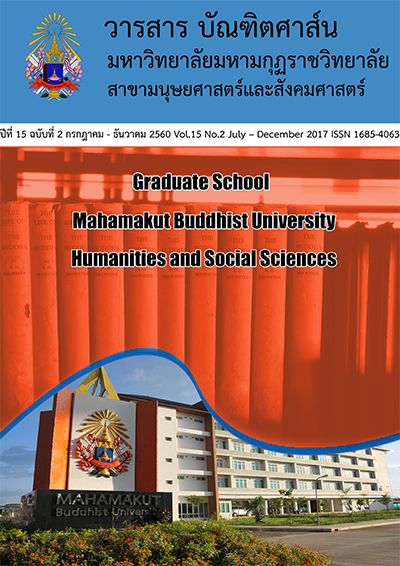การพัฒนาทรัพยากรมนุษย์ที่มีความสัมพันธ์ต่อการปฏิบัติงานของอาจารย์วิทยาลัยเอกชนในเขตกรุงเทพมหานคร
คำสำคัญ:
การพัฒนาทรัพยากรมนุษย์, ความสัมพันธ์ต่อการปฏิบัติงาน, วิทยาลัยเอกชนบทคัดย่อ
การวิจัยครั้งนี้มีวัตถุประสงค์เพื่อ 1) ศึกษาปัจจัยส่วนบุคคลประกอบด้วย เพศ อายุ คุณวุฒิ ประสบการณ์ในการสอน และรายได้ต่อเดือนที่มี ความสัมพันธ์ต่อการปฏิบัติงานของอาจารย์วิทยาลัยเอกชนในเขตกรุงเทพมหานคร 2) ศึกษาความสัมพันธ ์ระหว่างปัจจัยด้านกิจกรรมพัฒนาทรัพยากรมนุษย์กับ ผลการปฏิบัติงานของอาจารย์วิทยาลัยเอกชนในเขต กรุงเทพมหานคร 3) เพื่อเสนอแนะปัจจัย และรูปแบบ กิจกรรมการพัฒนาทรัพยากรมนุษย์ที่จะส่งผลต่อ ประสิทธิภาพ และประสิทธิผลการปฏิบัติงานของอาจารย์ วิทยาลัยเอกชนในเขตกรุงเทพมหานครการวิจัยครั้งนี้เป็น การวิจัย เชิงปริมาณ (Quantitative Research) เครื่องมือที่ใช้ เป็นแบบสอบถามนำไปเก็บรวบรวมจากกลุ่ม ตัวอย่างที่เป็นอาจารย์ประจำคณะของวิทยาลัยเอกชน ต่างๆ ที่ตั้งอยู่ในเขตกรุงเทพมหานคร จำนวน 212 คน สถิติที่ใช้ในการวิเคราะหข์อมลู คือ การแจกแจงความถี่ (Frequency) ค่ารอยละ (Percentage) ค่าเฉลี่ย (Mean) ค่าเบี่ยงเบนมาตรฐาน (Standard Deviation) การวิเคราะห์ ค่า t-test และการวิเคราะห์หาความแปรปรวนแบบ ทางเดียว One Way Analysis of Variance (F-test) วิเคราะห์ค่าสัม ประสิทธ์ิสหสัมพันธ์ของเพียร์สัน (Pearson Correlation) และวิเคราะห์สมประสิทธ์ิสหสัมพันธ์พหุคูณ แบบเป็นขั้นตอน (Stepwise Multiple Regression) ผลการวิจัย พบว่า อาจารย์วิทยาลัยเอกชนที่มี เพศ ประสบการณ์ในการสอน คุณวุฒิ และรายได้ต่อ เดือนต่างกันมีการปฏิบัติงานไม่แตก ต่างกัน ซึ่งไม่ สอดคล้องกับสมมติฐานที่ตั้งไว้ ส่วนอาจารย์วิทยาลัยเอกชนที่มีอายุต่างกันมีการปฏิบัติงานแตกต่างกัน อย่างมี นัยสำคญั ที่ระดับ .05 ผลการวิเคราะห์ตัวแปรปัจจัยด้าน กิจกรรมพัฒนาทรัพยากรมนุษย์ส่งผลต่อการปฏิบัติงาน ของอาจารย์วิทยาลัย เอกชนในเขตกรุงเทพมหานครอย่าง มีนัยสำคัญ ทางสถิติที่ระดับ .01 โดยตัวแปรปัจจัยด้าน กิจกรรมพัฒนาทรัพยากรมนุษย์สามารถอธิบายความ แปรปรวน ของการปฏิบัติงานของอาจารย์วิทยาลัยเอกชน ได้ประมาณร้อยละ 70.50 (Adjust R2 = .705) ที่เหลือ อีกร้อยละ 29.50 เป็นผลจากตัวแปรอื่นๆ ที่ไม่ได้นำมา พิจารณาซึ่งนำค่าสัมประสิทธ์ิของตัวพยากรณ์มาเขียน สมการได้ดัง นี้สมการพยากรณ์การปฏิบัติงานของอาจารย์ วิทยาลัยเอกชนในเขตกรุงเทพมหานครเท่ากับ .299 ใน กิจกรรมการพัฒนาวิชาชีพ (X4) เท่ากับ .226 ในกิจกรรม การฝึกอบรม (X1) เท่ากับ .172 ในกิจกรรมพัฒนา คุณธรรม จริยธรรม (X6) เท่ากับ .163 ในกิจกรรม การศึกษาของบุคลากร (X2) เท่ากับ .159 ในกิจกรรมการพัฒนาคณะและหน่วยงาน (X5) เท่ากับ .137 ในกิจกรรมการพัฒนาบุคลากร (X3) เท่ากับ .136 ในกิจกรรมการสร้างความ สัมพันธ์ในนองคกร์ (X7)
ข้อเสนอแนะในการวิจัยครั้งนี้ มีดังต่อไปนี้ 1. ผู้บริหารควรส่งเสริมกิจกรรมการพัฒนาวิชาชีพแก่ อาจารย์ในวิทยาลัยของตนเองอย่างจริงจังและต่อเนื่อง โดยเฉพาะอย่างยิ่งการจัดทำคู่มือการปฏิบัติงาน การประเมิน สมรรถนะ (Competency) ในงานที่ ปฏิบัติ และการจัดให้มีระบบสารสนเทศภายในเพื่อการเรียนรู้ด้วย ตนเองเนื่องจากมีความสำคัญต่อผลการปฏิบัติงานของ อาจารย์ในลำดับต้น ๆ 2. ผูบ้ ริหารควรส่งเสริมกิจกรรมการ พัฒนาทรัพยากรมนุษย์ด้านอื่น ๆ ไปพร้อมกันด้วยเพื่อให้ เกิดการพัฒนาประสิทธิภาพการปฏิบัติงานที่ดีขึ้นใน ภาพรวมของทั้งองค์กร 3. ผู้ปฏิบัติงานควรทุ่มเทในการพัฒนากิจกรรมต่าง ๆ ด้วยตนเอง ทั้งในด้านการจัดทำคู่มือการปฏิบัติงานให้เกิดความรู้ความเข้าใจและใช้ในการ ถ่ายทอดแนะนำแก่อาจารย์ใหม่ ควรพัฒนาการเรียนรู้ ระบบสารสนเทศที่ทันสมัยเพื่อนำ มาประยุกต์ใช้ในการทำงาน รวมถึงต้องรู้จักการกำหนดทิศทางในการทำงาน และวางแผนความก้าวหน้าในหน้าที่การงานของตนเอง 4. ผู้บริหารวิทยาลัย ควรมีการส่งเสริมให้พนักงานได้รับการ ฝึกอบรม การฝึกทักษะด้านการวิธีคิดเชิงระบบ ควรเปิด โอกาสให้อาจารย์มีการสร้างวิสัยทัศน์ร่วมกันในการ ปฏิบัติงานควรมีการนำประเด็นต่าง ๆ มาพิจารณาทบทวน ร่วมกัน เพื่อปรับปรุง และพัฒนาการปฏิบัติงานด้านการ เรียนรู้ร่วมกันเป็นทีม 5. ผูบ้ ริหารควรมีการสนับสนุนใน ด้านงบประมาณ เพื่อให้มีทุนการศึกษาแก่อาจารย์ที่ต้องการ จะศึกษาเพิ่มเติม เพื่อให้อาจารย์ที่ได้รับการส่งเสริมให้ ศึกษาต่อกลับมาทำงานให้กับวิทยาลัยอย่างมีประสิทธิภาพ มากขึ้น
เอกสารอ้างอิง
เกรียงไกรยศ พันธุ์ไทย. (2550). องค์การการเรียนรู้ที่แท้จริง. วารสารบริหารธุรกิจ. 30,115 (ก.ค.-ก.ย.): 31-44
จันทร์เพ็ญ มีนคร. (2555). การพัฒนาทางด้านวิชาการของอาจารย์มหาวิทยาลัยราชภัฏกลุ่มรัตนโกสินทร์. ปรัชญาดุษฎีบัณฑิตการบริหารการพัฒนาทรัพยากรมนุษย์, มหาวิทยาลัยปทุมธานี.
ชูชัย สมิทธิไกร. (2542). การฝึกอบรมบุคลากรในองค์การ. (พิมพ์ครั้งที่ 2). กรุงเทพมหานคร: จุฬาลงกรณ์มหาวิทยาลัย.
ชูศรี รัตนะ. (2552). เทคนิคการใช้สถิติเพื่อการวิจัย. กรุงเทพมหานคร: พิมพ์ลักษณ์
ทวีป อภิสิทธิ์, (2551). เทคนิคการเป็นวิทยากร. (พิมพ์ครั้งที่ 3). กรุงเทพมหานคร: สำนักพิมพ์แห่งจุฬาลงกรณ์มหาวิทยาลัย
ทิศนา แขมมณี. (2546).การพัฒนากระบวนการคิด: แนวทางที่หลากหลายสำหรับครู. กรุงเทพมหานคร: วารสารราชบัณฑิตยสถาน.
ธานินทร์ กรัยวิเชียร. (2546). คุณธรรมและจริยธรรมของผู้บริหาร. นนทบุรี: ศูนย์ส่งเสริมจริยธรรม สถาบันพัฒนาข้าราชการพลเรือน สำนักงาน ก.พ.
นิชชิชญา นราฐปนนท์. (2556). การพัฒนาทรัพยากรมนุษย์ทางด้านการฝึกอบรมของธุรกิจประกันชีวิตในประเทศไทย. บริหารธุรกิจดุษฏีบัณฑิต, มหาวิทยาลัยปทุมธานี.
ประเวศน์ มหารัตน์สกุล. (2551). การจัดการทรัพยากรมนุษย์: มุ่งสู่อนาคต. (พิมพ์ครั้งที่ 2). กรุงเทพมหานคร: พิมพ์ตะวัน.
ไพโรจน์ อุลัด. (2548). แนวคิด ทฤษฏี เกี่ยวกับการบริหารทรัพยากรมนุษย์. เข้าถึงได้จาก Available URL: http://it.aru.ac.th/courseware2/detail/chapter2/c22.htm.
เรียม ศรีทอง. (2540). มนุษยสัมพันธ์. (พิมพ์ครั้งที่ 2). กรุงเทพมหานคร: ฝ่ายเอกสาร และตำราสถาบัน ราชภัฏสวนดุสิต
ลิขิต ธีรเวคิน. (2548). วิวัฒนาการการเมืองการปกครองไทย. กรุงเทพมหานคร: สำนักพิมพ์มหาวิทยาลัยธรรมศาสตร์.
สร้อยตระกูล (ติวยานนท์) อรรถมานะ. (2541). พฤติกรรมองค์การ: ทฤษฎี และการประยุกต์. กรุงเทพฯ: โรงพิมพ์มหาวิทยาลัยธรรมศาสตร์.
สมดุล ดำทองสุก. (2554). การพัฒนาทรัพยากรมนุษย์ที่มีผลต่อการปฏิบัติงานของตำรวจกองบังคับการปราบปรามการกระทำผิดเกี่ยวกับอาชญากรรมทางเศรษฐกิจ. รัฐประศาสนศาสตร์ดุษฎีบัณฑิตมหาวิทยาลัยปทุมธานี.
สมบุญ ยมนา และคณะ. (2545). การพัฒนาทรัพยากรมนุษย์ในอุตสาหกรรมชิ้นส่วนคอมพิวเตอร์ของไทยเพื่อยกระดับความสามารถไปสู่การเป็นผู้ผลิตคอมพิวเตอร์แบบครบวงจร.
สุกัญญา รัศมีธรรมโชติ.(2550). Human Performance Enhancement: บทบาทของ HRD ยุคหน้า. Productivity World. (September-October): 72-77.
สุจิตรา ตั้งใจ. (2555). ความต้องการพัฒนาศักยภาพการปฏิบัติงานของทรัพยากรบุคคลในธุรกิจเอสเอ็มอี (SMEs) ในกลุ่มจังหวัดภาคกลาง. ปรัชญาดุษฎีบัณฑิตการบริหารการพัฒนา ทรัพยากรมนุษย์, มหาวิทยาลัยปทุมธานี.
สุจิตรา ธนานันท์. (2550). การพัฒนาทรัพยากรมนุษย์. (พิมพ์ครั้งที่2). กรุงเทพฯ: สถาบันบัณฑิต พัฒนบริหารศาสตร์.
สุดถนอม ตันเจริญ. (2553). ระบบการบริหารผลการปฏิบัติงานของสถาบันอุดมศึกษาในประเทศไทยศึกษาเฉพาะกรณีจุฬาลงกรณ์มหาวิทยาลัย และมหาวิทยาลัยเอเชียอาคเนย์. ปรัชญาดุษฎีบัณฑิตสาขารัฐประศาสตร์, มหาวิทยาลัยรามคำแหง.
สำราญ ถาวรยุศม์. (2553). การบริหารงานบุคคลสำหรับผู้บังคับบัญชา. กรุงเทพฯ: โรงพิมพ์คุรุสภาลาดพร้าว.
อรุณ รักธรรม. (2541). ทฤษฎีองค์การศึกษาเชิงมนุษย์สัมพันธ์.กรุงเทพมหานคร: สถาบันบัณฑิตพัฒนบริหารศาสตร์.
อลงกรณ์ มีสุทธา และสมิต สัชฌุกร. (2551). การประเมินผลการปฏิบัติงาน การประเมินโดยใช้Competency, KPI, Balance Scorecard, 360 องศา. กรุงเทพมหานคร: สมาคมส่งเสริมเทคโนโลยี (ไทย-ญี่ปุ่น).
อภิภา ปรัชญพฤทธิ์. (2554). หลังสมัยนิยม และการอุดมศึกษา. (พิมพ์ครั้งที่ 1). กรุงเทพมหานคร: สำนักพิมพ์อินทภาษ.
อัมรินทร์ นาคณัฐเศรษฐ์. (2555). การบริหารองค์ความรู้ในสถาบันอุดมศึกษาพื้นที่กรุงเทพมหานครด้านการแลกเปลี่ยน และการบริหารความรู้. รัฐประศาสนศาสตร์ดุษฎีบัณฑิต, ด้านการจัดการความรู้.
Antonacopoulou, E.P.(1999). Training Does Not Imply Learning: The Individual Perspective. International Journal of Training and Developmentm. 3 (1): 14-33.
Armstrong, Michael. (2006). Performance Management: Key Strategies and Practical Guidelines. (3rd ed.) London: Kogan Page.
Armstrong, M (2006). A Human Resource Management Practice. (10thed). Philadelphia: Kogan Page.
Armstrong, M. (2006b). Strategic Human Resource Management: A Guide to Action. (3rded). Philadelphia: Kogan Page.
Arthur, W.;Bennet, W.;Edens, P.S. and Bell, S.T. (2003). Effectiveness of Training in Organization: A Meta-Analysis of Design and Evaluation Features. Jounal of Applied Psychology. 88: 234 - 245.
Bacal, Robert. (2004). How to Manage Performance: 24 Lessons for Improving Performance. New York: McGraw-Hill.
Bakker, A.B., Demerouti, E. and Schaufeli, W.B. (2003).Dual Process at Work in a Call Center: An Application of the Job Demands-Resources Model.European Journal of Work and Organization Psychology. (12): 393-417.
Becker, E.B., Huselid, A.M.and Ulrich, D. (2001). The HR Scorecard.Boston: Harvard Business School Press.
ดาวน์โหลด
เผยแพร่แล้ว
รูปแบบการอ้างอิง
ฉบับ
ประเภทบทความ
สัญญาอนุญาต
บทความวิชาการและบทความวิจัยในวารสารฉบับนี้ถือเป็นความรับผิดชอบของผู้เขียนเท่านั้น บทความที่ได้รับการตีพิมพ์ในวารสารบัณฑิตศาส์น ถือเป็นลิขสิทธิ์ของมหาวิทยาลัยมหามกุฏราชวิทยาลัย ตามพระราชบัญญัติลิขสิทธิ์



